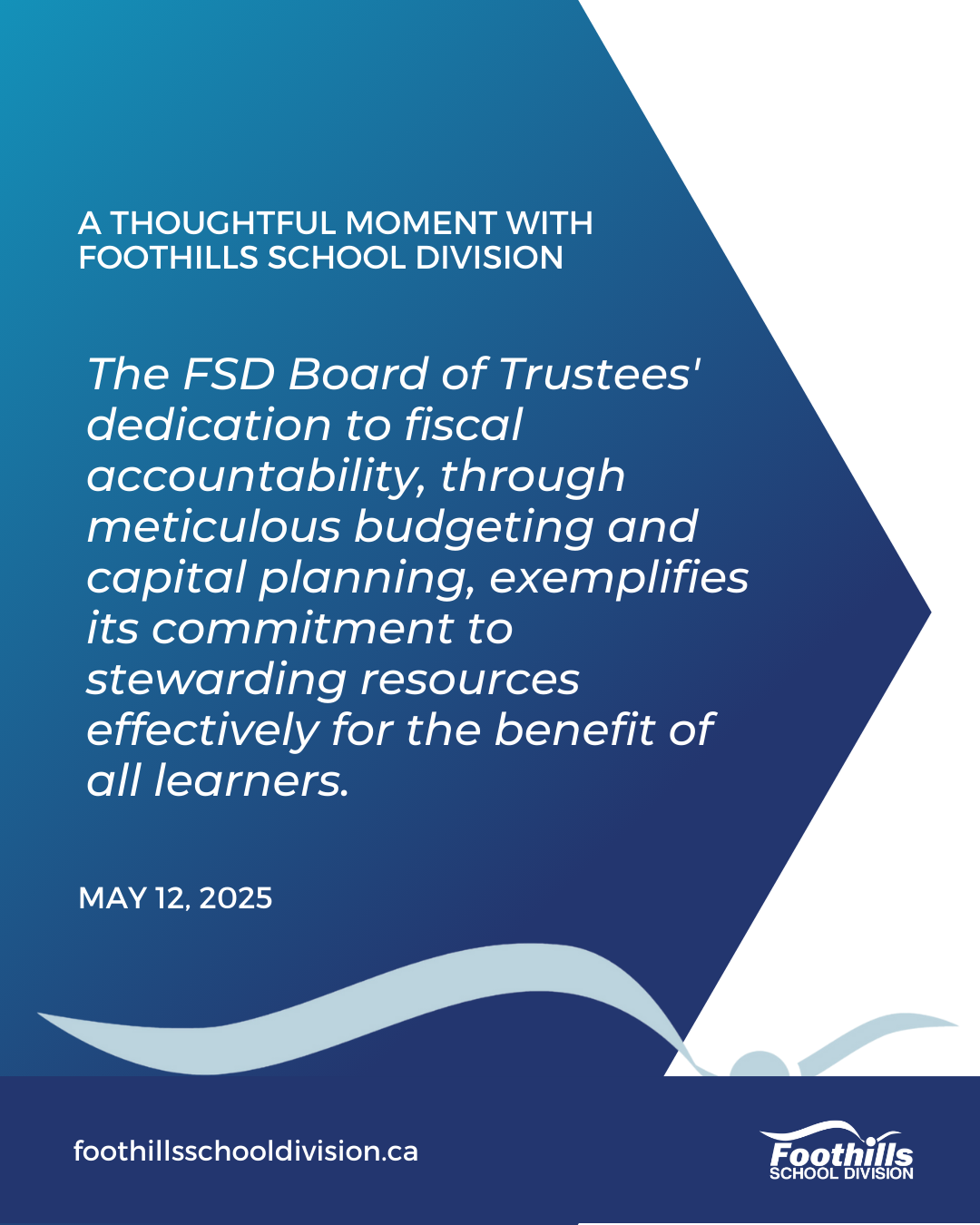ATM: Fiscal Accountability – Budget and Capital Planning
.jpg)
In the Foothills School Division (FSD), fiscal accountability stands as a cornerstone of effective governance, ensuring that educational resources are managed responsibly to support student success. The FSD Board of Trustees, guided by the Trustee Guide to Good Governance, embraces this responsibility with a focus on transparent budgeting and strategic capital planning.
Budgeting: Aligning Resources with Educational Priorities
Budgeting within FSD is a deliberate process that reflects the division's mission to nurture each student's unique gifts and abilities. The Board of Trustees plays a pivotal role in this process by:
- Establishing Budget Assumptions and Guidelines: Annually, the Board sets the foundational assumptions and guidelines that inform the development of the division's budget, ensuring alignment with strategic priorities. For example, in the 2024–2025 planning cycle, the Board emphasized maintaining classroom support levels despite rising operational costs and limited increases to base funding. The Board also continues to prioritize equity across the division, exploring staffing formulas and allocation models that support both urban and rural school contexts.
- Approving the Annual Budget: The Board reviews and approves the budget for submission to Alberta Education, ensuring that it addresses the mission, vision, values, and guiding principles of the division. In the 2024–2025 budget cycle, this included prioritizing funding for mental health supports, inclusive education, and student transportation in response to community feedback and learner needs.
- Monitoring Financial Performance: Through regular financial updates, the Board monitors the division's financial performance, ensuring that expenditures align with the approved budget and strategic objectives. An example of this is the Board’s careful oversight of reserve allocations used to mitigate staffing and programming impacts in schools facing declining enrolment. In addition, the Board values input from stakeholders—parents, students, and staff—and works to incorporate their insights through school council consultations and student advisory opportunities.
This structured approach ensures that financial decisions are made transparently and in alignment with the division's educational goals.
The Board also continues to recognize the evolving role of digital learning, allocating funds for improved Wi-Fi infrastructure, device access, and staff training to support 21st-century learning environments.
Together, these practices form a robust and transparent approach to fiscal accountability that ensures resources are aligned with educational goals and responsive to community needs.

Capital Planning: Investing in the Future of Education
Capital planning is integral to FSD's commitment to providing high-quality learning environments. The Board's responsibilities in this area include:
- Reviewing and Approving the Three-Year Capital Plan: Annually, the Board evaluates and approves the division's capital plan, which outlines priorities for infrastructure development and maintenance. In the 2025 Capital Plan, top priorities include modernization projects at École Senator Riley Middle School in High River and Cayley School in Cayley—both identified as needing significant upgrades to meet today’s educational and safety standards.
- Ensuring Alignment with Long-Range Plans: Capital planning decisions are guided by the division's long-range facilities and enrolment projections. This includes the ongoing design of a new Grades 10–12 high school in Okotoks, which will accommodate growing enrolment and enhance secondary programming options for students across the region. The Board is also monitoring elementary and middle school pressures in Okotoks, with interim solutions such as modular classrooms being explored to manage space constraints in the short term.
- Advocating for Resources: The Board actively engages with stakeholders, including government ministries, MLAs, and municipal leaders, to advocate for the resources necessary to implement capital projects. Recent advocacy efforts include promoting inclusive design elements and community partnerships in new builds, with a focus on long-term sustainability. In Okotoks, collaboration with the Town and local service agencies has helped strengthen shared use agreements and wellness programming housed within school facilities.
Through these actions, the Board ensures that capital investments are strategic, sustainable, and centered on student well-being.
Stewardship and Community Trust
The Board's fiduciary duty extends beyond financial oversight; it encompasses a commitment to ethical governance and community engagement. By adhering to principles of transparency, accountability, and inclusivity, the Board fosters trust and ensures that financial decisions reflect the values and priorities of the communities it serves.
FSD’s public budget presentations, capital planning updates, and ongoing efforts to consult with parents, staff, and students on resource allocation demonstrate a culture of open dialogue and responsive leadership.
The FSD Board of Trustees' dedication to fiscal accountability, through meticulous budgeting and capital planning, exemplifies its commitment to stewarding resources effectively for the benefit of all learners. This approach not only supports the division's educational mission but also reinforces the public trust essential to the success of public education.
For more information on the Board's responsibilities and governance practices, please refer to the Trustee Guide to Good Governance.
Yours in learning,
-4.png) Lisa Penzo
Lisa Penzo
Vice Chair
Trustee, Ward 4
References:
Trustee Guide to Good Governance Handbook 2021-2025
Advocacy by the Board of Trustees
